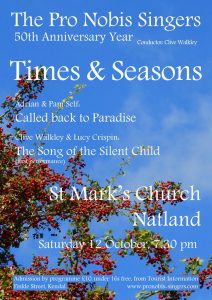 Are you sitting comfortably? Then we’ll begin.
Are you sitting comfortably? Then we’ll begin.
“In a time then and now/In a place far and near/In a world of which old stories tell/A land cradled in light―/Sun by day, moon by night―/Is held safe under summer’s sweet spell”. This is Summerland, where The Song of the Silent Child is set. The eponymous Silent Child is despised in this land of perpetual happiness, and it isn’t until she meets Old Mother Love, the Crone/wise woman who is dying, that the Child learns who she is: “’You go by (more…)
 This would be a fine place to spend eternity.
This would be a fine place to spend eternity.
From the lichened drystone wall where I sat the land rolled away to the horizon, a series of gradual grassy undulations punctuated with clumps of shrubs and trees. In the distance the peat browns and heather purples of the moor spread their muted patchwork; within the tiny churchyard itself, oaks, ashes and other trees were stretching (more…)
You can read this poem here.
Last year, while doing the prep. for a session I was running, I had most of the books off the poetry shelves, looking for texts about friendship that weren’t of the saccharine, emetic, vacuous or Inspirational Verse breeds. I wanted a poem that said something about what friendship is about, how it “works”, rather than merely saying what a Good Thing it is. The celebration of friendship in verse seems to be far rarer, though, than the celebration of romantic love. But I did eventually find a few poems I really liked, which I added to this quiet treasure by Jennings. It was a thought-provoking exercise to go through.
Friendship is, most of the time, both undramatic and glorious. It’s essential without (very often!) causing the pulse to race. I think this poem has the same quality of quiet wondrousness which it celebrates in its subject. It’s written in simple rhyming couplets which are neat without being clangingly predictable. Its rhythm is measured and regular without being stodgy, and is lifted by its judicious use of enjambement. Its vocabulary is unfussy but careful, naming clearly the simple but precious qualities it celebrates—’gentleness… understanding… trust… respect… awe’.
I find the use of the word ‘awe’ really interesting. It makes me think of how friendship—like any of the loves—can remind us, every so often, of the utter other-ness of the other party. This is a real person, distinct from us and with their own set of likes and dislikes, habits and experiences and quirks… and yet they choose to share time with us, to give us the precious gift of themselves. That is indeed awesome—in the Bill-and-Ted sense of great, but also in the proper sense of amazing, wonderful, breathtaking.
In her introduction, Duffy reveals the intention behind this collection: ‘we hope that these poems… will hold your hand’. The image, taken from one of the poems included in the book, is simple, clear, effective: it’s about comfort and companionship, recognition and acknowledgement. And I’d say the book does what Duffy puts on the tin.
There’s a mixture of poems you’re likely to have encountered already and poems which are probably new; similarly, there are a lot of familiar voices—Tennyson, Rosetti, Thomas, St. Vincent Millay, Thomas, and Duffy herself—as well as new ones, and anonymous/traditional texts too. Some are suitable for reading at a funeral or memorial; some feel more intimate. I particularly like the fact that such a range of moods is represented in this volume: shocked, angry, bewildered, wry, consoled, consoling, defiant, felled by loss… even in such a small book, something to find you in most moods.
And if you’re new to the poetry of loss, this would be a great place to start.
You can read this poem here.
Like Betjeman’s ‘In a Bath Teashop’ (which you can also read here), MacNeice’s ‘Meeting point’ captures an experience both ordinary (in the sense of common) and extra-ordinary: the exalted, exalting human experience of being “in love”. Though very different in tone, these poems both emphasise the time-out-of-time quality of the state of “in love-ness”. It is a privileged state in so many ways, of which ‘Meeting point’ reminds us; but, in the repeated refrain ‘time was away and somewhere else’, MacNeice emphasises how being in love frees us —for however long or short a time—from the usual human condition of being, and knowing ourselves to be, unavoidably subject to time. Indeed, by the end of the poem, the repeated refrain ‘time was away and somewhere else’ has become ‘time was away and she was here’. This underlines how the presence of the beloved obliterates and as it were replaces time.
I love so much about this poem. Aside from the refrain, however, what stays with me always is the line ‘God or whatever means the Good’. Particularly in a time when religion seems to be so divisive (though perhaps ’twas ever thus), this is, for me anyway, such a simple, beautiful and therefore useful way to refer to something/someone. It acknowledges the existence of different concepts and understandings—’whatever means the Good’—at the same time as it invites us to see what is common to them all.
And that penultimate stanza is so neatly circular. The word-for-word repetition in the first and fifth lines, and the way the stanza’s argument seamlessly moves us from statement to restatement, seems somehow to enact the process of “proving” something, which the stanza describes. ‘[T]he body’s peace’ manifests ‘what the heart has understood’, which itself verifies ‘God or whatever means the Good’; which whole process is a cause for praise to ‘God or whatever means the Good’. The process works forwards, backwards and probably sideways for all I can tell. Brilliant. Just brilliant.
Do have a look at the Betjeman, too. Some of the diction feels of its time, and may grate on 21st century sensibilities; but this poem, too, exalts the state of exaltation in a way which those of us lucky (?) enough to fall in love cannot but recognise.
 Are you sitting comfortably? Then we’ll begin.
Are you sitting comfortably? Then we’ll begin. This would be a fine place to spend eternity.
This would be a fine place to spend eternity.